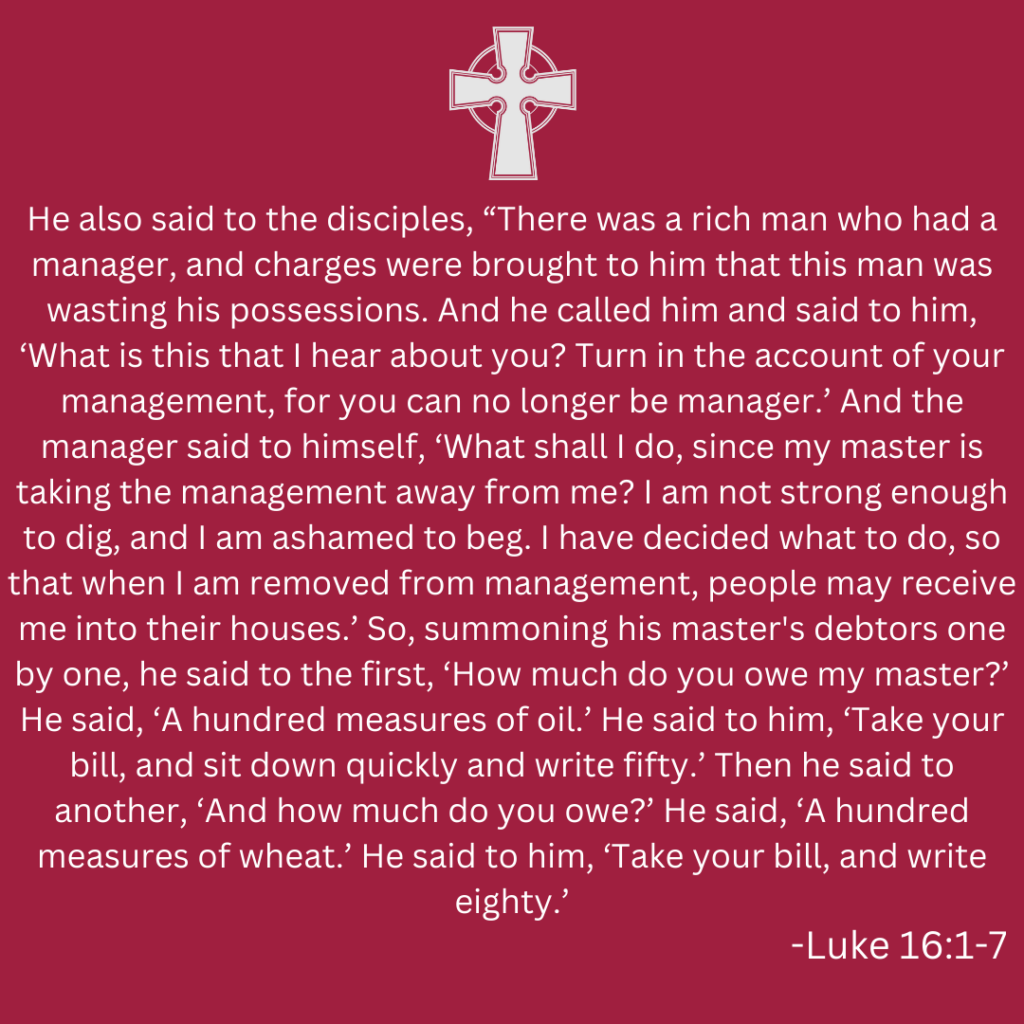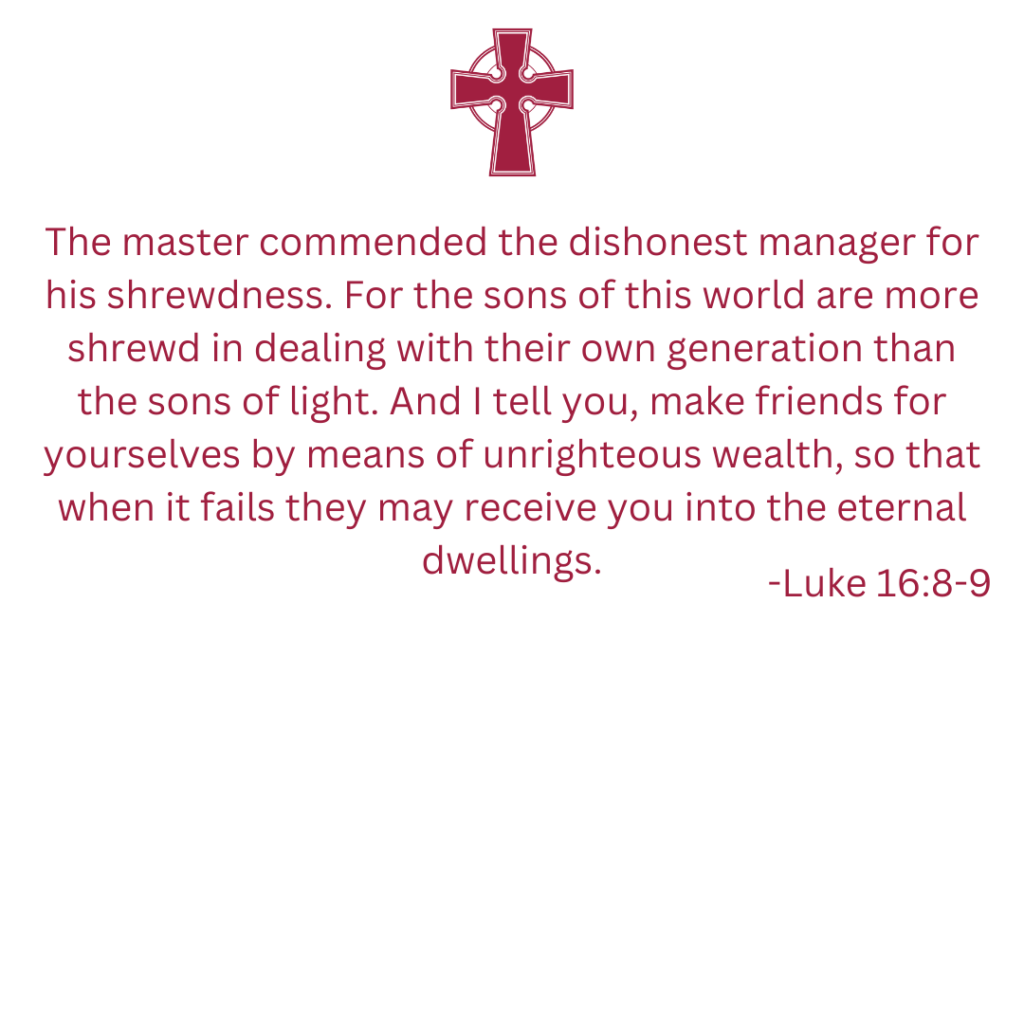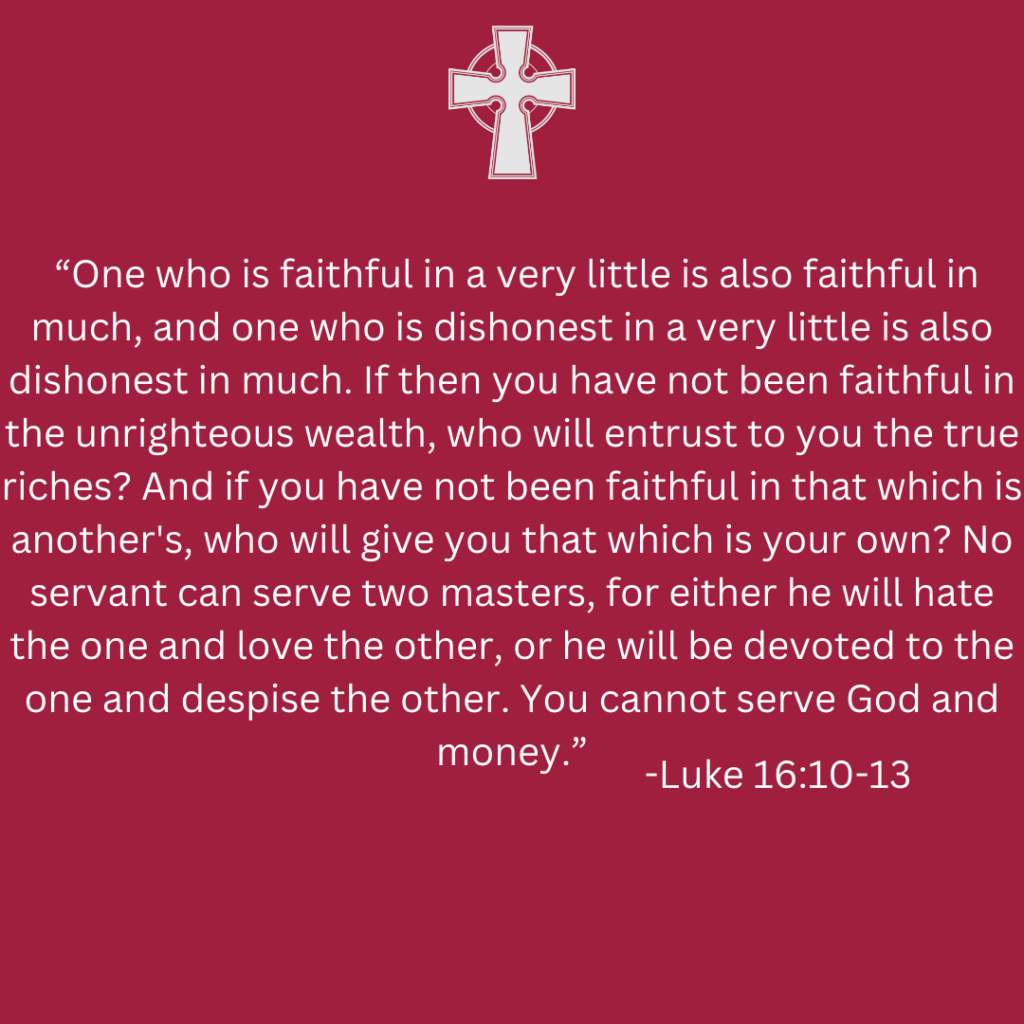
He also said to the disciples, “There was a rich man who had a manager, and charges were brought to him that this man was wasting his possessions. And he called him and said to him, ‘What is this that I hear about you? Turn in the account of your management, for you can no longer be manager.’ And the manager said to himself, ‘What shall I do, since my master is taking the management away from me? I am not strong enough to dig, and I am ashamed to beg. I have decided what to do, so that when I am removed from management, people may receive me into their houses.’ So, summoning his master’s debtors one by one, he said to the first, ‘How much do you owe my master?’ He said, ‘A hundred measures of oil.’ He said to him, ‘Take your bill, and sit down quickly and write fifty.’ Then he said to another, ‘And how much do you owe?’ He said, ‘A hundred measures of wheat.’ He said to him, ‘Take your bill, and write eighty.’ The master commended the dishonest manager for his shrewdness. For the sons of this world are more shrewd in dealing with their own generation than the sons of light. And I tell you, make friends for yourselves by means of unrighteous wealth, so that when it fails they may receive you into the eternal dwellings. Luke 16:1-9
As disciples, we are invited to engage with this puzzling parable. At first glance, it could look like Jesus is praising a sort of “ends that justify the means” type of wisdom. However, that isn’t the point. Jesus refused Satan’s temptation of presenting all the Kingdoms of the World in return that Jesus would worship that wicked serpent. Jesus refused what was rightfully His, that He might obtain it in accordance with His Father’s will. No, the ends never justify the means. The Unjust Stewart is tied into other paradoxical teachings like “… be wise as serpents and innocent as doves (Matthew 10:16)”. What Jesus is praising in the parable is the steward’s urgency to please his master in bringing him wealth, even in a shrewd and unconventional manner.

Martin Luther preached that this particular parable serves as a warning against the abuse of temporal wealth and a calling to use earthly resources for the glory of God and the good of other Christians. He noticed the parable pointing to the importance of using wealth to advance the Kingdom of God and to serve others in love and humility with a sense of urgency
Shrewd: Unrighteous Wealth v. Righteous Wealth
Have you ever stopped to consider what makes wealth righteous or unrighteous? Wealth can’t be righteous or unrighteous inherently. At our church plant, we’ve been exploring this question and defining righteous wealth as tangible things that benefit both the individual and society, while unrighteous wealth harms society and is often driven by selfish desires. Another key distinction that the parable provides is that unrighteous wealth is a temporary goal fixated on appetites, and from that, we can deduct from others of Jesus’ teaching that righteous wealth is eternal and fixated on those things above. But how can we as Christians use our “unrighteous” wealth to benefit both ourselves and society?

Love God: Use His Law for Faithful Stewardship
God’s law is a light to the Christian’s feet when it comes to using wealth properly. This guidance of using wealth righteously can be broken down into three key points:
Worshiping as the center of the community (Deut. 12:5-7)
Starting a church in hopes of it being the center of your community can be a daunting task, but the Reformed Episcopal Church (REC) provides valuable resources through its church planting guides. These guides offer information on a whole host of important steps but keep worship planning as a focal point. In addition, the guides include references to the REC’s theological concepts, worship practices, and church governance. To build a local Christian community, it is important to have a deep understanding of the theology of mission and the practical skills necessary to put that theology into action. The work of Roland Allen, a missionary and theologian, is a model our parish finds useful.
Household Teaching and Education (Deut. 6)
For families raising children in the fear and admonition of the Lord, Logos is a Christian publishing company that provides curriculum recommendations and resources for subjects such as Bible study, history, science, math, and language arts.
Leaving the Corners of the Crop for those in Need (Lev. 19:9-10 and Deut. 24:19-21)
Lastly, by leaving the corners of their crops unharvested, farmers in ancient Israel were helping to provide for those who were less fortunate. Similarly, Christians can use their resources, whether it be their time, talent, or treasure, to help those in need within their community. In the context of the church, this practice can take many forms. For example, a church might set up a food pantry or clothing drive to help those who are struggling financially. Or members of the congregation might volunteer their time to visit the sick or elderly, or to mentor at-risk youth. Ultimately, building a strong Christian community requires a deep commitment to prayer, study, and service.
These three points emphasize Christian education and community building to create a generation of “Sons of Light” who can serve the less fortunate and invite them to leave their current darkness and become adopted.

Serve God: Disciples heed Christ’s Totale Doctrina
Let’s not forget that this lesson was for His disciples in a moment of history. This is an important lesson to prepare them for the Great Commission and the end of the age. The disciples did tangibly impact their generation, the sons of light, with unrighteous mammon. Jesus’ teaching about prioritizing materials for the Sons of Light surely inspired the disciples to use their gains in a way that benefited their community and society. St Luke in the book of Acts records that the early church gave generously to the church, before the destruction of the Second Temple in 70 AD (Acts 4:32-37). Moreover, the warnings of Jesus to flee Jerusalem after certain signs were observed, as mentioned in Matthew, led many followers of Jesus to leave the city and give their wealth to one another before the siege.
Historical data that shows the early Christians practiced communal living and shared their resources with one another. And this continued to be a prudent and wise practice during high persecution. The Didache provides instructions for Christian communities on how to support traveling preachers and prophets and encourages them to share their resources with those in need. 1 Clement, for example, encourages the Corinthian church to give generously to support their fellow Christians in need, citing examples from the Hebrew Bible of righteous individuals who gave generously to others.
Therefore, the disciples did act shrewdly with their wealth and followed the teachings of Jesus to prioritize wealth for the sons of light. This can serve as an example for Christians today to use their wealth in a way that benefits their community and society, and to prioritize the eternal riches of faith, community, and relationships over material possessions. This is a true treasure where neither moth nor rust destroys and where thieves do not break in and steal.
This Age is Temporary; The Next is Forever
This present age of darkness will cease and has ceased. We embark on Earth, soar through heavenly places, and land at the crossroads of Heaven and Earth. We create gold and we create straw, hay, and stumble. Here, right now, our works will be judged on that fateful Day. All those things that were built outside of Christ will be burned with fire and those things that were focused on The Kingdom of God will be continued in glory. Jesus is shown to this present age by our love for one another (John 13:34,35; 1 John 4:7). Let is be shrewd like the unjust manager when it comes to sharing love with one another.
Coram Deo

As we reflect on the Parable of the Unjust Steward, we are reminded of the fleeting nature of this world and the eternal nature of heaven. Just like the steward who was called to use his master’s resources wisely, we too are called to steward our time and talents in a way that honors God and builds up His Kingdom. By focusing with urgency on the things that will endure – love, kindness, and faithfulness – we can leave a lasting impact on this world and prepare ourselves for the day when we will stand before Christ and give an account of our works. Let’s take time to reflect on Christ who is the author and finisher of our faith.
Almighty God, who hast given thine only Son to be unto us both a sacrifice for sin, and also an ensample of godly life; Give us grace that we may always most thankfully receive that his inestimable benefit, and also daily endeavour ourselves to follow the blessed steps of his most holy life; through the same thy Son Jesus Christ our Lord. Amen.
Related Resources:
Clement I, “The First Epistle of Clement to the Corinthians,” in The Ante-Nicene Fathers, ed. Alexander Roberts and James Donaldson, trans. J. B. Lightfoot, 1:5-46 (Peabody, MA: Hendrickson Publishers, 1994).
The Didache, 11:3-6.
Logos Press. Logos Homeschool Curriculum. Bellingham, WA: Faithlife, n.d. https://www.logos.com/homeschool-curriculum.
Luther, Martin. “The Parable of the Unjust Steward.” In Luther’s House Postil: Gospels: Vol. 2, edited by Eugene F. A. Klug, translated by John Nicholas Lenker, 170-180. Minneapolis: Lutherans in All Lands Co., 1904.
The REC100, Church Planting Guide (Dallas, TX: The Most Rev. Ray R. Sutton, n.d.), https://static1.squarespace.com/static/5b5f3e46e17ba3820cd5fd46/t/5b5fa6a6352f53c1e4c5e403/1532995247945/REC100-ParishPlantingBooklet.pdf.
Rutt, Steven Richard. Roland Allen II: A Theology of Mission. 1st ed. The Lutterworth Press, 2018. https://doi.org/10.2307/j.ctvj4swfq.
Sproul, R.C. “Signs of the End.” Ligonier Ministries. Accessed April 22, 2023. https://www.ligonier.org/learn/devotionals/signs-end/.
Our Mission
To multiply faithful servants of Christ; who will commit themselves to the worship and doctrines of the Anglican way, and who will work by God's grace and for His glory to disciple the nations through the ministry of the Church.









